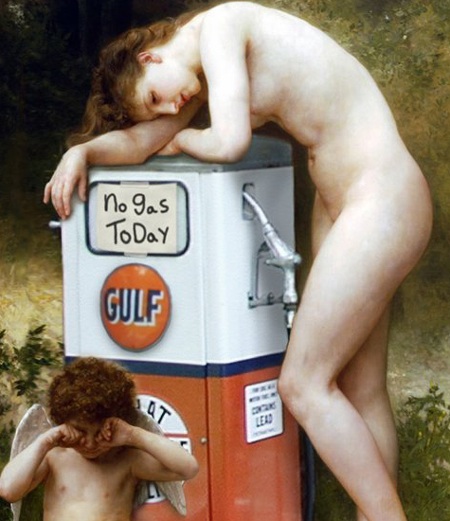Good to the last drop?
by Juan Wilson 26 August 2004 in Island Breath
http://www.islandbreath.org/2004Year/09-science/science11endofoil.html
A crisis is coming for much of the world: It is the end to the world oil economy as we know it. Much of the world's older oil sources are past their peak production and newer sources are not making up for increases in consumption. This increasing depletion in production capability appears to be inevitably leading us to the end of an economic order that dominates the world.
 image above: Satirical image based on style similar too French 19th painting.
From http://massgastax.com
image above: Satirical image based on style similar too French 19th painting.
From http://massgastax.com
We have known since the 1970's that the end of oil was coming. It was bad news and we didn't want to hear it. To blot out the ugly noises made by environmentalists and planners during the Carter years we simply tuned them out by electing Ronald Reagan: "It's morning in America".
Well the problem is back "big time". The rosy estimates that oil production would peak in another 10 to 40 years is out the window. Experts like T. Boone Pickens believe in the Peak Theory of oil production. He and others are now saying the the approximately 80 million barrels a day being currently pumped is as much oil as we'll ever see again. In today's dollars the 1979 Iranian hostage crisis drove oil to $80 dollars a barrel. A permanent shortage of oil could drive prices over $200 a barrel in the blink of an eye. If you could find gasoline, it would cost $8 a gallon.
The American Oil Age began in about 1900 with the discovery of oil in Pennsylvania. We are now at the top of the bell-curve in world use of fossil fuels. The Peak Theory estimates and that the hydro-carbon era will glide to an end about 100 years from today.
The question is: How rough will the transition be? What will change? Who will suffer? The growth in consumption of oil in places like China will accelerate the curve down in available oil in unpredictable ways. The struggle for oil resources between competing nations may have irrational and chaotic consequences to the stability of economic systems long before the oil runs out. In economics loss of faith in the future frequently is all that is necessary to crash what is seemingly a robust market (remember the Internet Bubble Burst in 2000?).
The smoothness of the transition away from oil will have a large effect on the quality of life for everyone concerned. Lifestyles will change. Places like the North East United States, where suburban sprawl and harsh winters are a factor, may be the earliest and most negatively affected. But that does not leave us here in Hawaii in the clear.
The airline dependent vacation industry in Hawaii will quickly wither and die in the grip of a permanent worldwide oil shortage. Tourism as we know it will not exist. That will have a catastrophic effect on Hawaii. We will have to re-invent ourselves. Many without a strong connection to that land and people here may choose to leave, if they can.
With 900,000 people the island of Oahu has 75% of the population of the state of Hawaii. Oahu's economy will be unsustainable if oil prices quadruple or gasoline supplies become unreliable. It is possible that as many as 75% of Oahu's population would have to be distributed to the other islands if the Hawaiian islands need to become self-sufficient. With an over-all population of 1,2000,000 that will be difficult but not impossible.The Big Island would likely take have to absorb as many as 500,000 people: Maui County 70,000, Kauai 40,000.
How will impending change away from an oil economy change life on Kauai? Well, as mentioned above, we have have an increase in population (to about 100,000) due to redistribution of people state-wide. That increase will partially off-set with the lack of tourists. It is likely that all existing agricultural land will be needed for food and energy production. Forget about ethanol. That is a temporary and false economic ploy that will have virtually no impact on energy self-sufficiency. The growth of bio-diesel crops will be the rational choice if there is to be any hydro-carbon energy on Kauai.
Now is the time for the KIUC to pay the people of Kauai to produce energy. We will need every watt of wind and solar energy we can find once the fuel barges no longer make stops in Nawiliwili Harbor and Port Allen. All electricity fuel on this island will have to be produced locally within ten years or we won't have an economy.
We need the people to understand the coming crisis. We need planners. We need solutions. There is little time. If you have doubts read on.
see also:
Over a Million Barrels a Day Lost to Depletion http://www.fromthewilderness.com/free/ww3/082304_million_depletion.shtml
by Jim Meyer odac@btconnect.com 24 August 2004
The End of Oil: Interview with Paul Roberts http://www.motherjones.com/news/qa/2004/05/paul_rob_qa.html
by Nonna Gorilovskaya backtalk@motherjones.com 8 June 2004
Will The End of Oil Mean The End of America? http://www.commondreams.org/views04/0301-12.htm by Robert Freeman robertfreeman10@yahoo.com 1 March 2004
Life After the Oil Crash http://www.lifeaftertheoilcrash.net/Introduction.html
by Matt Savinar matt@lifeaftertheoilcrash.net 8 January 2004
Good to the Last Drop (original posting) http://www.islandbreath.org/2004Year/09-science/science11endofoil.html by Juan Wilson juanwilson@mac.com 26 August 2004
No comments :
Post a Comment